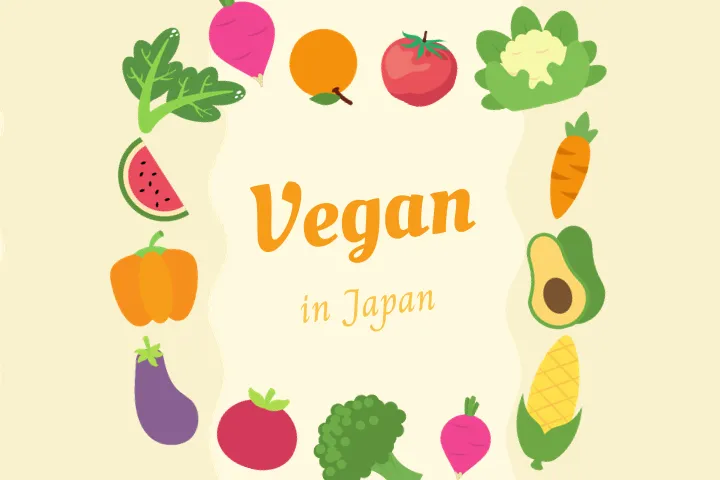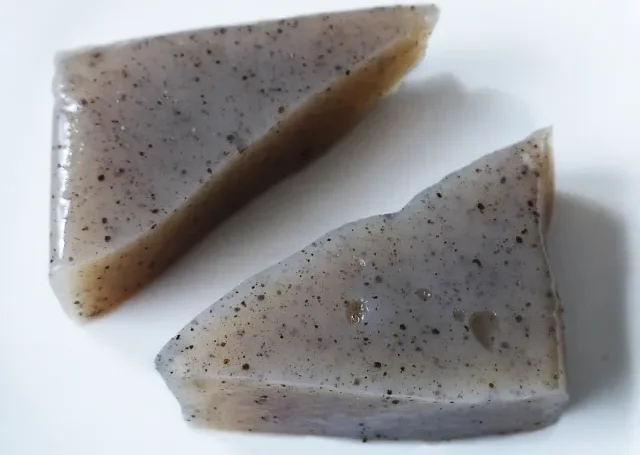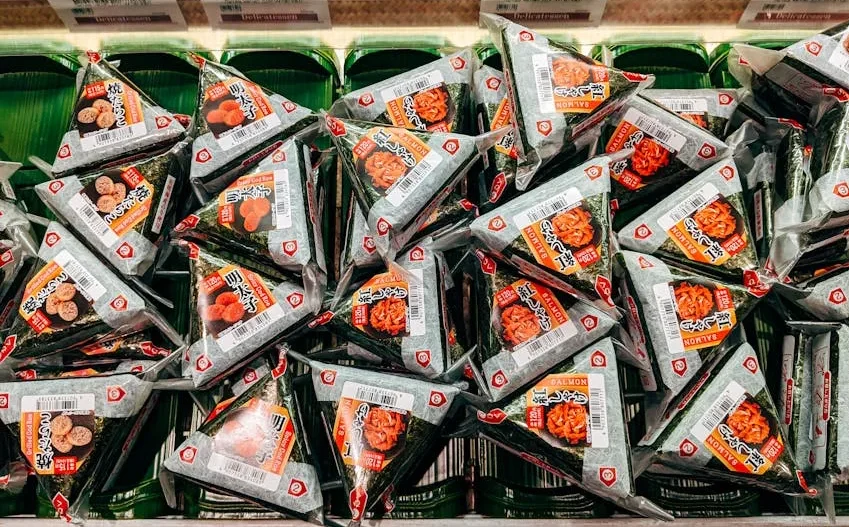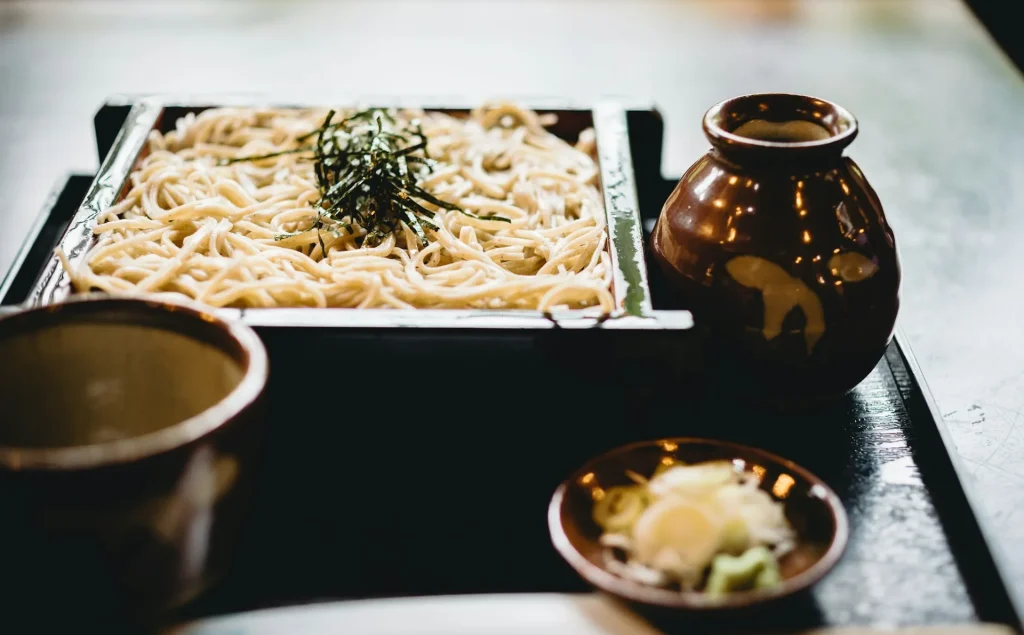What is Vegan Cooking and Sweets in Japan? Popular Dishes and Vegan Ingredients

In recent years, growing health consciousness and concern for environmental protection have drawn attention to vegan cuisine and sweets that do not contain meat or dairy products. In Japan in particular, traditional food culture and veganism have developed in their own unique way.
This article describes the current status of vegan food and sweets in Japan. It also details vegan restaurants and sweets stores, as well as vegan ingredients unique to Japan, such as tofu, natto (fermented soybeans), and konnyaku. It is full of information on the appeal of vegan Japanese cuisine.
Please take a peek into the new world of cuisine and sweets created by the encounter between Japanese food culture and veganism.
▼Goandup Picks Click here for recommended articles!
- Required before studying abroad! Goandup Nihongo+, an online Japanese language learning service
- This page introduces services for foreigners who wish to study in Japan or improve their Japanese language skills to learn Japanese online.
- Goandup Salon" community for foreigners living in Japan
- We introduce an online community where foreigners living in Japan can exchange information and interact with each other to support their life in Japan.
- Goandup Study" supports foreigners who want to study in Japan.
- This section introduces study abroad support services that provide comprehensive support to foreigners who wish to study in Japan, from preparation for study abroad to living in Japan.
- Where can I buy a prepaid SIM in Japan? Recommended SIM cards for foreigners are also introduced.
- How to purchase a prepaid SIM and suitable SIM cards for foreigners.
- The Complete Guide to Pocket Wi-Fi in Japan for Foreigners!
- We introduce how to select and recommend pocket Wi-Fi products that can be used conveniently in Japan.
- The Complete Guide to Finding a Job in Japan! Finding a job, changing jobs, and part-time work for foreigners
- This site provides foreigners who want to work in Japan with comprehensive information on how to find a job, recommended job sites, and other information necessary to find a job.
The Accelerating Popularity of Vegan Cooking and Sweets in Japan and Vegan Ingredients Specific to Japan

Here we will explain the background behind the growing popularity of vegan food and sweets in Japan. We will also introduce in detail the vegan ingredients unique to Japan.
Changing food culture and focus on vegan food and sweets
In recent years, the number of people choosing vegan and vegetarian diets has been increasing due to the health-conscious and environmental protection movements. Japan is no exception, and demand for vegan food and snacks is rapidly increasing, especially among the younger generation. As a result, many supermarkets and specialty stores are now offering more and more vegan food products.
Vegan cuisine and snacks are also gaining attention not only from a health perspective, but also from an animal welfare perspective. Growing awareness of the environmental impact of animal agriculture and animal welfare issues has led to support for meat- and dairy-free vegan food and snacks as an ethical choice.
Japanese Vegan Cuisine and Sweets Drawing Attention from Abroad
Vegan food and snacks in Japan are made from plant-based ingredients and do not contain any animal products. This is very appealing in today's environmentally conscious and increasingly health-conscious society.
In addition, Japanese vegan cuisine and snacks utilize traditional ingredients and are gaining international attention. For example, unique Japanese ingredients such as seaweed, soybeans, and even mushrooms are used in abundance. Vegan dishes and sweets with Japanese flavors are especially popular among foreigners, and are popular as souvenirs for foreign visitors to Japan.
Popular Vegan Foods in Japan, a Vegan Haven
Japanese food culture has long utilized a diverse range of ingredients. Soybeans, konnyaku, and seaweed are particularly compatible with the vegan lifestyle, and vegan dishes and snacks centered on these ingredients can be enjoyed in a variety of forms. Unique Japanese methods and flavors transform these ingredients into even more appealing vegan dishes and snacks. Let's take a look at some of the most popular ingredients and their appeal and how they can be used in vegan cooking and confectionery.
soya bean (soybean)
Soy products have long been common in Japan, and "soybeans" occupy a very important place in Japanese food culture. They are high in protein, isoflavones, and other nutrients, and are an essential ingredient for vegans. Tofu" and "natto" made from soybeans can be enjoyed as-is as vegan foods. Soy milk" is also often used as a substitute for dairy products, and is useful as an ingredient in smoothies, dishes, and desserts.
Tofu is used in a variety of dishes such as "chilled tofu" and "mapo tofu. It is also widely used in processed forms such as "abura-age" and "thick tofu. Soy milk is essential for creamy dishes such as "Soy Milk Soup" and "Soy Milk Gratin. It can also be used in desserts such as "Soy Milk Ice Cream" and "Soy Milk Pudding.
solidified jelly made from the rhizome of devil's tongue (konnyaku)
Konjac" is made from konjac potatoes and is known as a low-calorie, diet food. It is characterized by its jelly-like texture and is rich in dietary fiber. Konjac is mainly used in simmered, grilled, and one-pot dishes, but recently "konjac noodles," a pasta substitute made from konjac, have also become popular. It is valued as a healthy staple food.
Vegan dishes using konjac are also attracting attention, such as konjac salad, in which konjac is chopped into small pieces and combined with vegetables, and miso dengaku, in which konjac is dipped in miso sauce and baked. In addition, fruit-flavored konjac jelly is popular as a healthy dessert.
seaweed
Seaweed is an essential ingredient in Japanese food culture. Seaweed includes wakame (seaweed), nori (seaweed), and kombu (kelp), each of which has its own unique texture and flavor. All are commonly used in Japanese cuisine, especially in soups, salads, sushi, and a wide variety of other dishes. They are highly nutritious, especially rich in minerals and dietary fiber.
Typical vegan dishes using seaweed are "wakame soup" and "seaweed salad. Norimaki," a simple dish consisting of vegetables rolled in seaweed, is also popular among vegans. Kelp can be enjoyed in various forms, such as "Kombu-maki" and "Kombu-no-Tsukudani.
As mentioned above, Japan's unique vegan ingredients such as soybeans, konnyaku, and seaweed are highly nutritious and can be enjoyed in a variety of cooking methods. By making good use of these ingredients, you will be able to enjoy a wide variety of vegan dishes and snacks.
Vegan food and snacks you must try in Japan

Next, let's take a look at Japanese vegan food and snacks that can be enjoyed in the restaurant scene. From specialized vegan restaurants in urban areas to unique menus in local areas, a wide variety of choices await you.
Vegan food and pastry stores in urban areas
Vegan-friendly restaurants are on the rise in the major cities of Tokyo, Osaka, and Kyoto. In particular, restaurants that offer vegan versions of traditional Japanese dishes are gaining popularity. For example, you can enjoy unique menus such as sushi with vegetables as the main ingredient, or yakiniku restaurants that use soy meat.
There are also an increasing number of cafes and bakeries specializing in vegan food. There is a wide selection of vegan sweets, from lattes and smoothies made with soy milk to egg- and dairy-free cakes and cookies. In urban areas, you are sure to find a place to enjoy vegan food and sweets.
Vegan food and pastry store in local area
More and more restaurants and cafes serving vegan food and snacks are opening not only in urban areas but also in rural areas. Vegan cuisine using regional specialties is particularly appealing, as it allows visitors to enjoy the unique flavors of the region.
For example, dishes using wild vegetables are popular in mountainous areas, and seaweed-based menus are popular in areas by the sea. Vegan versions of traditional sweets from the region are also attracting attention. Vegan dishes and sweets that make use of local ingredients will be a new discovery in your travels.
Japanese vegan food and sweets readily available in the city
In Japan, there are traditional dishes and sweets that can be eaten safely by vegans. Walking around town, you may be able to find vegan-friendly menu items at casual restaurants.
For example, "onigiri" are popular as an easy-to-eat food, and recently the number of vegan-friendly onigiri has been increasing. Onigiri made with kelp, sesame, or vegetables are safe for vegans. Also, traditional sweets such as "onsen manju" are now available in vegan versions that do not contain eggs or dairy products.
Other menu items such as "soba" and "udon" are served with dipping sauces that do not contain animal broth. Oden," which can be found in Japanese convenience stores, is also vegan-friendly as long as you choose vegetable-based ingredients such as konnyaku, daikon radish, and ganmodoki. Finding vegan-friendly dishes and snacks as you explore the city is one of the best parts of traveling.
Traditional Japanese Vegan Japanese Cuisine

Traditional Japanese cuisine has many menu items suitable for vegans. Here we explore the deep relationship between Japanese food and veganism, focusing on dishes and sweets that preserve traditional methods.
Typical Japanese-style vegan food and sweets
Traditional Japanese cuisine has always been vegetable-based, making it a good match for vegans. Among them, "vegetarian cuisine," a style of cooking derived from Buddhism that does not use meat or fish, is a typical example of vegan Japanese food.
In vegetarian cooking, a variety of dishes are prepared using plant-based ingredients such as tofu, vegetables, konnyaku, and yuba. For example, "sesame tofu," "cooked vegetables," and "konnyaku dengaku" are characterized by their simple yet deep flavors. Vegetarian dishes served at temples are also safe for vegans.
Some Japanese sweets are also suitable for vegans. Wagashi with red bean paste, such as "ohagi" and "anmochi," are generally made without animal products. Mizyokan" and "Kuzumochi" are also popular among vegans. More and more Japanese confectionery stores are catering to vegans while maintaining traditional production methods.
Vegan Cooking and Sweets Using Okara
Okara, which is produced when making tofu, is one of the essential ingredients in vegan cooking. It is rich in protein and fiber and low in calories. Okara has long been used in Japanese home cooking as well.
For example, "okara-ni" is a dish in which okara is simmered with vegetables, giving it a relaxing and gentle flavor. Also, okara is sometimes used as an ingredient for croquettes, as in "okara croquette". With okara, a healthy and hearty vegan dish can be completed.
Okara is also used in confectionery. Okara cookies, okara muffins, and other sweets are made by mixing okara into the dough, giving them a crunchy texture and a subtle sweetness. Since okara is used instead of eggs and dairy products, they are safe for vegans to eat. Using okara is a great way to enjoy sweets without feeling guilty.
Vegan dishes and snacks utilizing sesame
Sesame is one of the essential ingredients in Japanese cuisine, but it is also a great addition to vegan dishes. Sesame seeds are rich in high-quality protein, fiber, vitamins and minerals.
Sesame Tofu is one of the most famous vegan dishes using sesame. This dish is made by mixing tofu and ground sesame and hardening it. The aroma of sesame and the smooth texture of tofu can be enjoyed. Sesame paste" is a simple dish of vegetables and sesame, but the flavor of sesame adds an accent to the dish.
In confectionery, "sesame dango" or "sesame dumpling" is a typical example. These dumplings are made by rolling out a dough filled with sesame and steaming it. Sesame can also be used to make creamy desserts such as black sesame pudding.
【 Healthy and Delicious 】 Japanese Vegan Cooking and Sweets Ranking

Here we introduce 10 popular vegan dishes and snacks in Japan. They are all healthy and delicious.
1. soy milk miso soup
Miso soup is a staple of Japanese cuisine, but it can also be enjoyed by vegans if soy milk is used as the broth. The sweetness of soy milk and the flavor of miso make a perfect match in this dish.
2. steamed vegetables
Steamed seasonal vegetables make a healthy dish that makes the most of the natural flavors of the ingredients. The light flavor makes it a good choice for vegans.
3. cooked ganmodoki
Ganmodoki is a traditional vegan food made with vegetables. Cooking Ganmodoki together with vegetables creates a dish with a wholesome and gentle flavor.
4. konjac jelly
Jelly made from konjac is popular among health-conscious vegans. Characterized by its pulled texture and moderate sweetness, it is attracting attention as a dessert that can be enjoyed without guilt.
5. soy milk pudding
Pudding made with soy milk, without eggs or dairy products, is a classic vegan dessert. Its smooth texture and gentle sweetness are appealing.
6. vegetable tempura
Vegetable tempura wrapped in a crispy batter is a popular menu item for vegans. The sweetness of the vegetables can be fully enjoyed by simply seasoning them with salt.
7. simmered kiriboshi-daikon
Kiriboshi Daikon is a great vegan food with lots of fiber. With its robust soy sauce-based flavor, it is a dish that is sure to be enjoyed with rice.
8. okara doughnut
Healthy doughnuts made from okara are the new standard in vegan sweets. The crunchy texture and subtle sweetness are appealing.
9. soy milk smoothie
This easy-to-drink smoothie based on soy milk is becoming increasingly popular among vegans. They are also excellent with fruit.
10. deep-fried tofu
Deep-fried tofu topped with vegetables is a satisfying vegan dish. It is served with starchy sauce.
These are some of the popular vegan dishes and snacks in Japan. We hope you will try our healthy and delicious menus.
Serious employment support to help you realize your dream of working in Japan!

Do you want to work in Japan?
Let us "Goandup" make that dream a reality!
【 Program Features 】
✅ JLPT N3 level Japanese language acquisition
✅ Thorough preparation for the specific skills test
✅ Full support for job hunting in Japan
Business-focused one-on-one lessons will help you find a job in Japan in the shortest possible time.
【 Program Menu 】
- Individual Japanese language lessons
- Intensive curriculum to obtain N3, especially specialized lessons for business Japanese that can be used at work.
- Intensive curriculum to obtain N3, especially specialized lessons for business Japanese that can be used at work.
- Preparation for the Specific Skills Test
- Customized materials for specific skill tests will be used to focus on frequently asked questions and learning to pass the test.
- Customized materials for specific skill tests will be used to focus on frequently asked questions and learning to pass the test.
- Resume and CV support
- To create resumes and CVs tailored to Japanese corporate culture, and to brush up on self-promotion and motivation for application.
- To create resumes and CVs tailored to Japanese corporate culture, and to brush up on self-promotion and motivation for application.
- Interview Preparation
- Guidance on areas for improvement through mock interviews and feedback based on corporate interview scenarios. Learn interview etiquette and behavior unique to Japan.
- Guidance on areas for improvement through mock interviews and feedback based on corporate interview scenarios. Learn interview etiquette and behavior unique to Japan.
- career consulting
- Provide introductions to companies that match the participant's career goals, select companies to apply to, and provide advice on the level of knowledge required by the companies to which the participant is applying.
- Provide introductions to companies that match the participant's career goals, select companies to apply to, and provide advice on the level of knowledge required by the companies to which the participant is applying.
- Chat Support
- In addition to one-on-one individual lessons, we also accept casual questions via DM (visa application, living support, assistance in finding a room, etc.).
If you are serious about your career in Japan, join us now!
▶︎ for more informationclick here.
We will do our best to support your success in Japan!
summary
Vegan cuisine and snacks in Japan have developed in a unique way, combining the wisdom of traditional Japanese cuisine with vegan ideas. The menu is characterized by an abundance of dishes that make use of traditional, familiar ingredients such as tofu, natto, and konnyaku.
Vegan-friendly restaurants are on the rise in the restaurant scene. Specialty vegan restaurants and restaurants offering vegan menus are appearing mainly in urban areas. Convenience stores and supermarkets are also increasing the variety of vegan products.
Vegan food in Japan has a reputation for being healthy and delicious. The fusion of tradition and innovation in the cuisine and pastries is sure to be enjoyed by all, not just vegans. We will continue to keep an eye on the vegan situation in Japan.
Your support will help us!
Thank you for visiting Goandup Picks. Our mission is to provide you with more useful information to show the world what Japan has to offer.
Your support will help us to further enhance our activities, so please support us!






